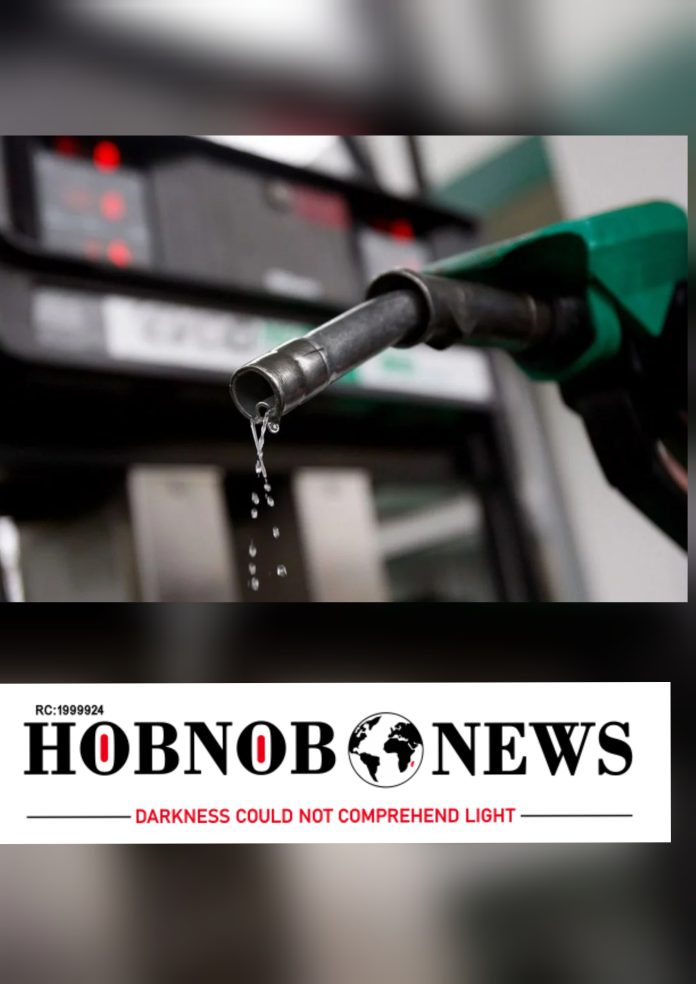Hobnob News reports that the Nigerian National Petroleum Company Limited (NNPCL) has increased the pump price of Premium Motor Spirit (PMS), popularly known as petrol, to N990 per litre in the Federal Capital Territory (FCT) and N960 per litre in Lagos. This adjustment represents a significant rise from the previous prices of N965 and N925, respectively.
Despite a marginal dip in crude oil prices on Tuesday, Hobnob News’s findings at several filling stations confirmed the upward price adjustment. This change amounts to a 2.1% increase, or N20, above the N970 price recently announced by the Dangote Refinery in collaboration with MRS, Ardova, and Heyden filling stations.
Market Dynamics and Deregulation in Play
The adjustment underscores the effects of deregulation in the petroleum sector, which allows prices to fluctuate in response to supply and demand dynamics. Recent developments, such as the full commencement of loading operations at the Dangote Refinery, are anticipated to reshape Nigeria’s fuel supply chain. The refinery’s $20 billion facility recently raised its PMS price from N899 per litre to N955 per litre at its loading gantry, prompting dealers to predict further hikes due to the upward trend in crude oil prices.
Nationwide Observations and Price Hikes
In Abuja, Hobnob News’s correspondents observed varying prices at different NNPCL outlets. While a station at Airport Junction was retailing petrol at N990 per litre, another at Life Camp sold at N970 per litre but was not dispensing fuel to waiting customers. A station in Mabuchi continued to sell at N965 per litre.
Independent and major marketers have also adjusted prices, with some selling as high as N1,030 per litre. Along Abuja’s Airport Road, stations like AYM Shafa and Matrix retailed petrol at N1,000 per litre, while Shema stations sold at N1,030. In Lagos, prices ranged between N960 and N1,000, with the NNPCL Alapere station adjusting its price to N960 by 3 p.m. on Tuesday. Reports from Akwa Ibom indicate prices reaching up to N1,100 per litre.
Dangote Refinery’s Role and Expert Opinions
Sources within private depots revealed that loading activities began seamlessly on Monday, with bulk marketers obtaining products at N965 to N975 per litre, which subsequently retailed above N1,000 in Lagos and other states. Experts attribute the hike to global market forces and the broader impacts of deregulation.
“These changes reflect market realities and emphasize the deregulation of the petroleum sector, which aims to address fuel scarcity and stabilize prices,” said Olatide Jeremiah, an oil and gas expert. He added that this surge is a temporary effect of global developments, including sanctions on Russian oil companies and recent shifts in U.S. leadership.
Crude Oil Price Trends
On Monday, Brent crude oil futures fell to $79.98 per barrel from $81 last Friday, while WTI crude for February delivery dropped to $76.46 per barrel. However, the inauguration of new U.S. leadership on Tuesday prompted Brent crude to rebound marginally to $80.05.
Impact on Consumers and Retailers
The adjustment has elicited mixed reactions from consumers. A tricycle operator in Lagos expressed frustration over the disappearing queues at NNPCL stations following the price hike. “We thought prices might drop, but instead, they increased again,” he lamented.
Major filling stations, including TotalEnergies, Matrix, MRS, and Ardova, have also adjusted their pump prices. On the Lagos-Ibadan Expressway, prices varied from N950 to N1,000 per litre, depending on the station.
Some stations reportedly continued selling older stock purchased at N899 per litre, providing temporary relief to consumers. However, experts warn that rising crude oil prices could sustain the upward trend in PMS prices, aligning Nigeria’s energy market with global benchmarks.
Conclusion
As Nigeria navigates its deregulation policy and global oil market realities, consumers should prepare for continued fluctuations in petrol prices. While the changes reflect market-driven forces, stakeholders hope that long-term benefits, such as improved supply chains and reduced scarcity, will outweigh the current challenges.

